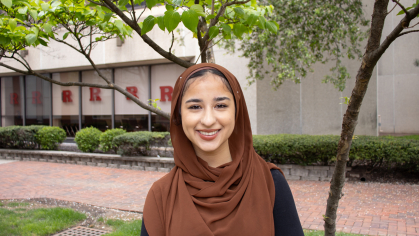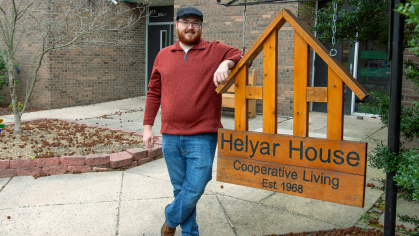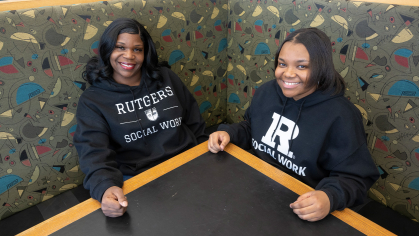After Developing Brooklyn Nets Fan Site, a Senior Sees His Future in AI
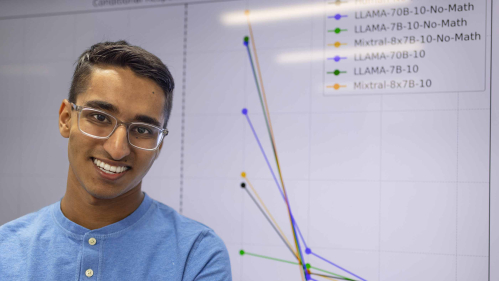
Double major Tej Shah aims to make artificial intelligence-enhanced technology to streamline processes and make life more efficient
At 5-foot-9, basketball was never really in the cards for Tej Shah – even if it did help pave his path to the Big Ten.
“When I was in high school, my brother and I built a popular Brooklyn Nets fan site,” said Shah, a Rutgers Honors College senior and computer science-business analytics double major. “It reached 50,000 views a month and fueled my interest in innovation-driven entrepreneurship.”
“As I became more involved in these types of projects, I realized a key bottleneck to building great things is having people with great technical talent,” he said.
Since arriving at Rutgers University–New Brunswick in September 2020, Shah has worked diligently to become the kind of talent he said the tech world needs. Although his Nets fan site was archived years ago, his dedication to becoming a “great technical talent” remains very much alive.
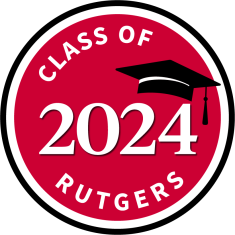
When Shah graduates in May, he’ll join a talent pool with the skills necessary to thrive in the world of Big Tech. Shah knows how advanced computing systems work, how to build them, and – most importantly – how to put them to use solving real-world challenges. His 4.0 grade point average is icing on the cake.
Instead of building sports sites for fans, Shah is hoping to create technology using artificial intelligence that streamlines processes and makes life, and work, more efficient.
“My long-term goal after Rutgers is to commercialize AI and to help solve really important problems,” said Shah, adding that health care, clean energy and fighting disinformation are among the areas that captivate him. “Whether that’s through starting a company, joining a company, or doing research, I don't know. For now, I'm more focused on the outcomes than on the vehicle.”
In many ways, Shah was preparing for Rutgers his entire life. His older brother, Ravi, a current vice president at IA Capital Group, attended Rutgers, graduating in 2018. And like his brother, Shah attended Morris Hills High School in North Jersey, where he was part of the magnet program for math and science whizzes.
In 2017, Shah attended MIT Launch at the Massachusetts Institute of Technology, a four-week summer program for high school students to develop entrepreneurial skills. From 2018 to 2020, he qualified for and competed in the FIRST robotics championships, designing, building, programming and testing robots in competition.
Perhaps Shah’s proudest pre-Rutgers moment came in 2019, when as a junior he took top honors at his high school’s calculus games, an annual math competition that pits the brightest in a head-to-head matchup of mathematical guile.
“That was a real catalyst for me,” he said.
Shah lumps his time at Rutgers into three buckets: research, internships and clubs.
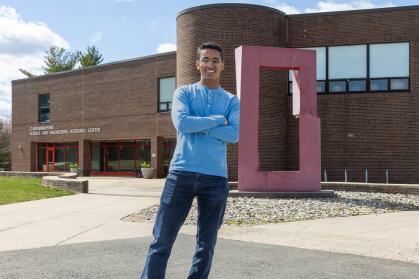
His first bucket took time to fill up. On March 17, 2020, two months before Shah accepted his Honors College invitation, Rutgers announced that all in-person classes and events would be suspended indefinitely. Remote learning continued for more than a year.
But rather than wallow, Shah used the time to determine precisely what kind of research he wanted to focus on.
“As my high school calculus teacher Mr. Bermel advised us at the time, we should be like Isaac Newton during the plague – when he invented calculus – and use our extra time wisely,” he said.
For Shah, that meant pouring over research papers on artificial intelligence.
I want to use AI to automate processes. Take health care. There are many tedious back-office tasks that artificial intelligence could clean up. Or green technology. With AI, we can build smarter, more efficient carbon-capture systems.
Tej Shah
Rutgers Honors College senior
“I’d started to see a lot of AI-related research taking off,” he said. “I also knew that I was uniquely poised to understand the basics of what was happening. I had the foundational math, statistics, and computer science knowledge, so I spent that summer self-studying a lot of stuff with AI.”
By the time in-person classes resumed, in July 2021, Shah, now in his second year, had landed a remote research gig with Rutgers computer science assistant professor Sungjin Ahn, whose own mentor, computer scientist Yoshua Bengio, had just won the Turing Award for work on artificial intelligence.
Over the next two summers, Shah completed several internships, all on the West Coast. He worked for Interos, a supply chain risk management company, as a product manager and was concurrently involved at Kleiner Perkins, a venture capital firm, as a product fellow; and for Amazon Web Services as a software development engineer.
In his senior year, he joined the Rutgers Memory Optimization Lab, where he investigates memory capabilities for large language models, running experiments to draw comparisons with standard human behavior described in psychology literature.
Shah does more than study and ideate. He plays the tabla, a classical Indian drum; is vice president of the Rutgers Jainism club (Bucket No. 3); and is an avid reader. He recently finished The Coming Wave, by DeepMind cofounder Mustafa Suleyman, about the risks AI and other technology might hold for the global order.
It was a fitting read for a man in Shah’s line of work. But while he recognizes the challenges human-complementing technology poses, Shah also recognizes the vast potential.
“I want to use AI to automate processes,” he said. “Take health care. There are many tedious back-office tasks that artificial intelligence could clean up. Or green technology. With AI, we can build smarter, more efficient carbon-capture systems.
“To me, AI is general-purpose technology. I think it will be cool to apply it to as many problems as possible.”
